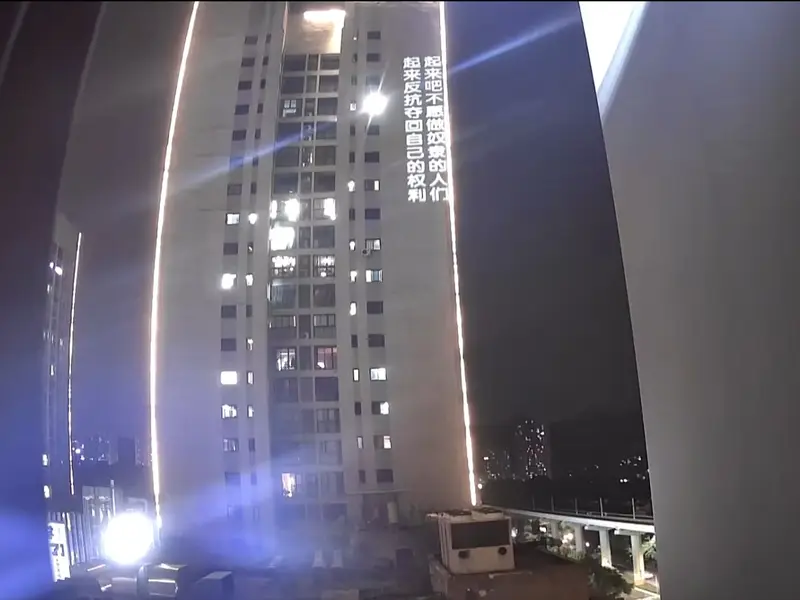On the night of 29 August, anti-Communist slogans were beamed onto the side of a high-rise building in Chongqing, a city of more than 30 million residents in southwest China. Among the messages were:
- “Freedom is not a gift. It must be reclaimed.”
- “A new China can only come when there is no Communist Party.”
- “No more lies, we want the truth. No more slavery, we want freedom.”
Four different statements alternated across the façade — a rare public challenge to the Chinese Communist Party (CCP) in one of the country’s most tightly controlled urban centres.
Chinese police quickly traced the projection to a hotel room nearby. Inside, officers found a small beam projector hidden behind curtains and a handwritten note urging them to “treat those who criticise the Communist Party kindly,” warning that even beneficiaries of the system could one day become its victims. Despite disabling the device, authorities were unable to locate its operator — because he was thousands of kilometres away in London.
The man, Qi Hong (43), later identified himself to The Times as a performance artist and long-time critic of the CCP. He said he had left China with his wife and daughters just nine days earlier, telling his family they were taking a holiday in the UK. In reality, he had rented the hotel room for several days, requested no cleaning or service, and remotely activated the projector from abroad.
Qi also published footage showing five Chinese police officers discovering and switching off the projector, while one gestured toward the room’s security camera. He subsequently released a second video showing local police interrogating his elderly mother at her rural home — a glimpse of the personal cost of dissent in China.
Analysts said Qi’s act highlighted the double-edged nature of technology in authoritarian states. “While the government uses advanced tools to monitor and control its citizens, the same technologies can be repurposed for resistance,” The New York Times observed. Social media commentator Li Wing described Qi’s move as “outmanoeuvring the police and bypassing state mechanisms” — a symbolic blow to the authorities ahead of a heavily policed Victory Day parade.
Open defiance of the CCP inside China is rare, as punishments can be severe. But the party has faced pockets of public anger, most notably during the strict Zero-COVID lockdowns of 2022, which sparked protests and creative acts of dissent such as the “blank paper” demonstrations.

Qi has cited as an influence Peng Lifa, the physicist known as “Bridge Man,” who in October 2022 unfurled a banner in Beijing demanding Xi Jinping’s resignation before being arrested. Like Peng, Qi used symbolism and visibility rather than mass mobilisation to draw attention.
Born in 1982 into poverty and leaving school at 16, Qi spent years working odd jobs before launching an online retail business. Over time, his posts on Chinese social media became increasingly critical of the state. On the 33rd anniversary of the Tiananmen Square crackdown, he wrote: “Seeking light is a duty for every thinking human.” His 2024 New Year message read: “May everyone be free from fear.”
According to Qi, the timing of his protest was deliberate. He wanted his slogans circulating online just before the high-profile military parade marking the World War II victory on 3 September, attended by foreign leaders. In early August, he quietly tested his projector for 10 days with neutral messages such as “Stay healthy” and “Be happy” before leaving China and launching the real protest from abroad.
By editing and distributing the footage to prominent online figures, Qi ensured the videos went viral — illustrating both the fragility of the CCP’s information controls and the growing sophistication of Chinese dissenters who operate beyond its borders.


